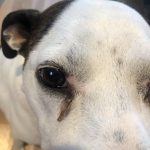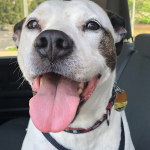Hot flashes? I don’t know that this is something dogs experience. She could be feverish, though.
Good morning pawbly friends. Our newest addition to our family, Rontu, has started “clicking” in his hips. He’s another GSD, almost a year old. All of our other GSDs have always been older rescues- so I’m wondering if this is something he could possibly outgrow? He just recently started this. It usually, but not always, occurs when he goes to a sitting position. It’s irregular- as in it doesn’t happen every time. It sometimes happens when he is walking but again, sporadically. Any advice or thoughts would be helpful. Thank you!! Happy Thanksgiving?
Comments
Can a young spayed female dog have hot flashes? I’ve experienced her feeling quite warm and moist at times.
Bosun has this discharge in his eye.
I think he always has a little? But is there something I can use to clean it up?
Comments
I rescued a young Golden Retriever in May. She had spent the start of her life abandoned in a small cage, she was emaciated, covered in fleas and ticks and of course living in her own waste. She is a wonderful dog, everything is new and she has very much been a blank slate. She is well exercised, is very social with our other dogs and has successfully completed a basic obedience class and will be moving on to 2nd level training and beyond. Thankfully she does not hold her rough start in life against humans in the least. Her only downfall is that she eats stool from our other dogs in the yard. We keep the yard clean, however we have 5 dogs. Even cleaning the yard daily is likely to leave a pile. She will even wait for our smaller dog to go to eliminate so she can eat it as fresh as possible. I imagine that she probably ate her own feces when she was starving, I am quite sure that this is a learned behavior. Over the course of 5 years my family has fostered 80+ dogs. I know that this is a very hard habit to break, however “poop kisses” are rather disgusting so I would love some input on what has worked for others! Thank you in advance.
Comments
I need help finding a surgeon for luxation of both scapula in a cat. I’ve been to two vets, called countless surgeons in multiple states, and even emailed a professor who wrote one of the articles I have found on the issue. All of them say something different (with the exception of the email that has yet to be returned). My vet said they couldn’t do anything but take x-rays, a second opinion (regular vet practice) offered injections of Adequan (which won’t fix the problem). When I asked my vet about the effectiveness of injections they turned around and said they’d sell me Ichon injections (which seem even more questionable) which is interesting they didn’t suggest it sooner if they could.
Of the surgeons I’ve called, I’ve asked all of them if they have experience in this rare condition. Surgery isn’t the only option; I’ve done my research. Surgery isn’t always the best treatment depending on severity and individual factors of the cat. But all of them seem to be selling the surgery. They won’t consider anything else.
Everyone wants me to bring him in so they can take their own x-rays and do their own exam, which I understand to a point but I’m a student with only so much money. While I’m willing to put what it takes if my cat needs surgery, I don’t want to spend thousands just on consults before we even do a potential surgery. And what am I supposed to do but get another opinion when everyone gives me a different diagnosis that fits their practice? One hospital even said bring the cat to their ER now which I know is wrong because I know while he may be uncomfortable, he is not in pain. I would not let him be in severe pain. I don’t want him uncomfortable either, but I need to know that I’m making the best decision not just being sold a service *especially* if it’s one he doesn’t need.
Please, please, please let me know if you know of anyone with experience in this area. Private practice to university professor wanting to use it as educational- I just need someone with experience beyond “knowing how to do it in theory.” Any help is beyond appreciated!!
Comments
Hi pawbly friends-
My mom was dog sitting tonight so that we could take the kiddos trick or treating and there was a fight between all three of our guys. Do not know the trigger. Our old guy is limping around and is pretty slow, and our girl is limping a bit. Our new guy seems no worse for the wear. My question is whether or not it is ok to keep them separated tonight or will that backfire on me for tomorrow when I take them for a walk to try and pack up again to move past this setback?
Sushi is my 12-year old cat with an inoperable cancerous tumor. Last weekend she stopped eating and was vomiting bile. At the vet’s, her bloodwork showed high kidney and creatinine levels. After three days on an IV, her kidney levels returned to normal, but the creatinine remained high, confirming her cancer diagnosis. While the vet said she had been eating well in the office, since she came home three days ago, she has not eaten at all. We’ve tried everything: k/d wet and hard food, chicken and rice, her regular food, baby food, tuna, and Fresh Pet, but she hasn’t eaten anything, although she is drinking water. Sushi is very lethargic and stays in her hiding place most of the time. We go back to the vet in the morning, but I hate to put her through another stay at the vet’s if the results may be the same. Can anyone give me advice as to what I should do? I cannot stand the fact that she may be suffering.
My cat is an approximately 7 years old, 13lbs, tuxedo male who has always been an indoor cat. He was popping a lot this summer but every time I called the vet they brushed me off till I brought him in. Then they were shocked and said they’ve never seen this in a cat before, and only in one dog besides. They said he’s subluxating in both of his shoulders and there was nothing they could do. I took him to another vet who also practiced animal chiropractic care hoping they would help, but now one shoulder is fully luxated and they could only suggest a type of glucosamine injection. I did what research I could on feline subluxation and know surgery is the only real fix, so I’d really like advice on a) if injections would be helpful or if I should go ahead with the surgery ASAP before he gets any older and b) if ANYONE knows a feline orthopedic surgeon who has experience with this. I’ve inquired around my state but no luck and I want someone knowledgeable since this is such a rare condition.
Comments
If it helps a puppy to grow up with another puppy does the same hold true for kittens? Will cats be happier and better adjusted if they have a sibling? Does it help to get 2 from the same litter or should they be unrelated?
Comments
We have an almost 8 month old hound mix. We were thinking about getting an invisible fence. I’m curious about any opinions you have of invisible fences and also if you think it’s a good idea for a hound. Thank you.














I’d get rads done of the hips to see what’s going on, to be quite honest. He’s a rescue, so you don’t know his history, but you do know the breed’s very prone to hip dysplasia.
Hello,
I agree that an exam and probably radiographs are a good idea. With a click we worry about the joint. Xox